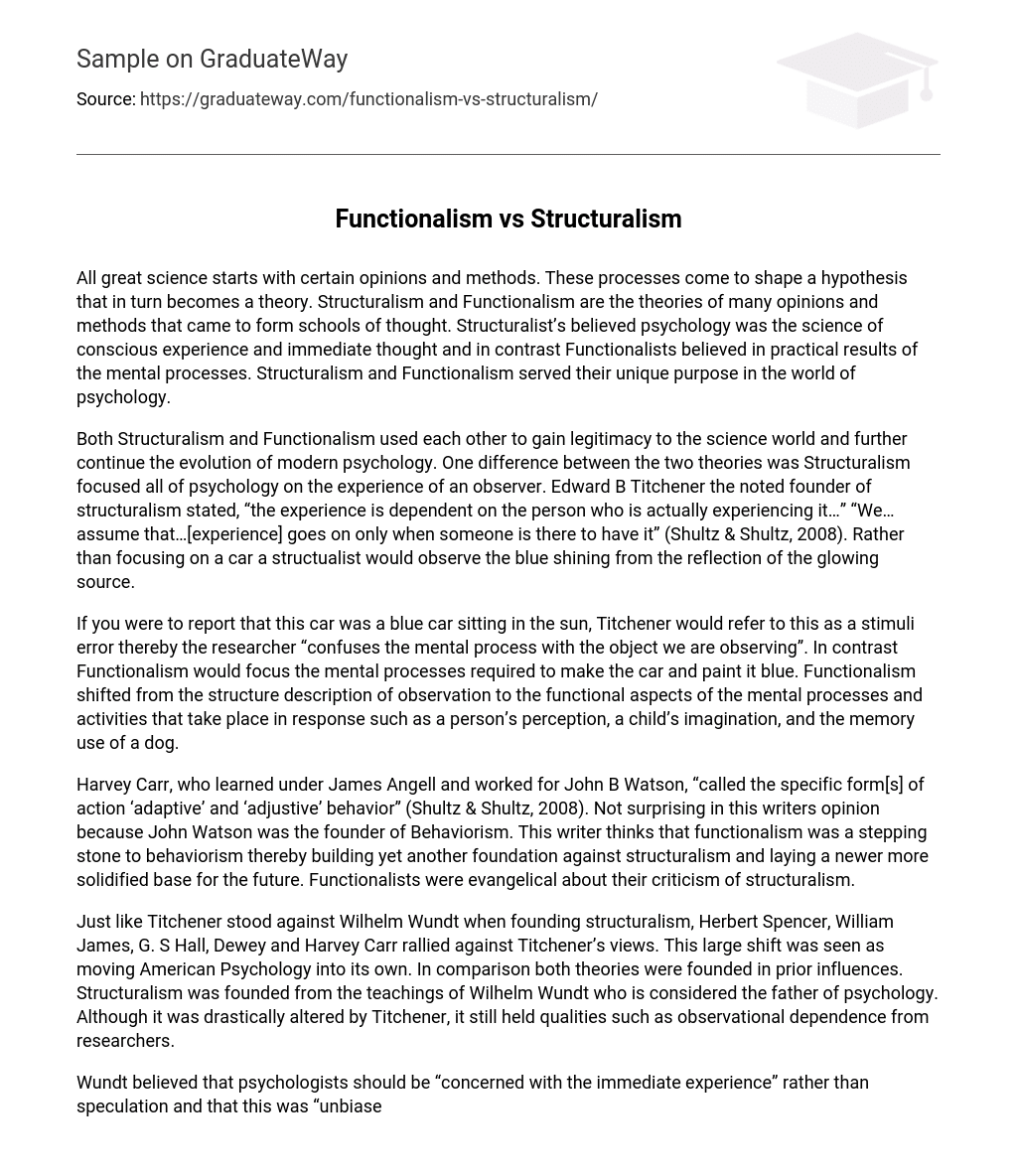All great science starts with certain opinions and methods. These processes come to shape a hypothesis that in turn becomes a theory. Structuralism and Functionalism are the theories of many opinions and methods that came to form schools of thought. Structuralist’s believed psychology was the science of conscious experience and immediate thought and in contrast Functionalists believed in practical results of the mental processes. Structuralism and Functionalism served their unique purpose in the world of psychology.
Both Structuralism and Functionalism used each other to gain legitimacy to the science world and further continue the evolution of modern psychology. One difference between the two theories was Structuralism focused all of psychology on the experience of an observer. Edward B Titchener the noted founder of structuralism stated, “the experience is dependent on the person who is actually experiencing it…” “We… assume that…[experience] goes on only when someone is there to have it” (Shultz & Shultz, 2008). Rather than focusing on a car a structualist would observe the blue shining from the reflection of the glowing source.
If you were to report that this car was a blue car sitting in the sun, Titchener would refer to this as a stimuli error thereby the researcher “confuses the mental process with the object we are observing”. In contrast Functionalism would focus the mental processes required to make the car and paint it blue. Functionalism shifted from the structure description of observation to the functional aspects of the mental processes and activities that take place in response such as a person’s perception, a child’s imagination, and the memory use of a dog.
Harvey Carr, who learned under James Angell and worked for John B Watson, “called the specific form[s] of action ‘adaptive’ and ‘adjustive’ behavior” (Shultz & Shultz, 2008). Not surprising in this writers opinion because John Watson was the founder of Behaviorism. This writer thinks that functionalism was a stepping stone to behaviorism thereby building yet another foundation against structuralism and laying a newer more solidified base for the future. Functionalists were evangelical about their criticism of structuralism.
Just like Titchener stood against Wilhelm Wundt when founding structuralism, Herbert Spencer, William James, G. S Hall, Dewey and Harvey Carr rallied against Titchener’s views. This large shift was seen as moving American Psychology into its own. In comparison both theories were founded in prior influences. Structuralism was founded from the teachings of Wilhelm Wundt who is considered the father of psychology. Although it was drastically altered by Titchener, it still held qualities such as observational dependence from researchers.
Wundt believed that psychologists should be “concerned with the immediate experience” rather than speculation and that this was “unbiased” and pure in method (Shultz & Shultz, 2008). Titchener took a more introspective spin on this approach in his own view. A view Shultz and Shultz (2008), noted had been Titchener’s viewpoint while he studied under Wundt. Titchener, proposed the importance “to discover so-called atoms of the mind” (Schultz & Schultz, 2008), thus reducing the mind to three mental experiences: sensations, images, and affections.
Functionalism like Structuralism was founded in the past writings and viewpoints of first generation scientists Charles Darwin and Francis Galton. Darwin’s thoughts were mostly about evolution but he was concerned with the processes that allowed an organism to adapt to its environment thus by changing the behavior it became a more functional part of its adapted environment (Shultz & Shultz, 2008). James Angell (1908) stated in his book Psychology: An Introductory Study of the Structure and Function of Human Consciousness that functionalism was the process of the whole mind rather than parts.
Herbert Spencer formulated from Darwinism a “system called synthetic philosophy. ” This synthesis was meant to combine all the knowledge and experience of evolutionary principles. (Shultz & Shultz, 2008). William James added to this, the specific concentration towards complex functions of adaptation of people. By coining the phrase “stream of consciousness,” William James tried to approach thought as a constant thought that is never broken. Signifying that, thoughts continually occur and accumulate.
This was entirely in contrast with the immediate experience that Wundt and Titchener modeled. Functionalism also contrasted its origins in the fact that it was accepted by vigorously opposing structuralism. This impact is partly why America largely adopted its developments and findings. Functionalism was functional in a time when practicality was sought after in a growing industrialized America. Today researchers have taken these elements of streaming thought and applied that to the continuous stream of neurological activities that happens when we are awake and asleep.
This writer thinks that both theories served a major purpose for evolving psychology. By legitimizing psychology in the eyes of traditional science, it allowed researchers to seek government approval in societal research, education, and government needs. This paved the way to greater global needs today. In this writers opinion these important foundations help develop neurology, sociology and anthropology to regard human study as the betterment of humans rather than the betterment of science.
References
Shultz, D. P., & Shultz, S. E. (2008). A history of modern psychology. Belmont: Thomson Wadsworth.





